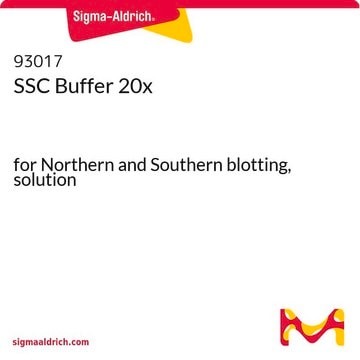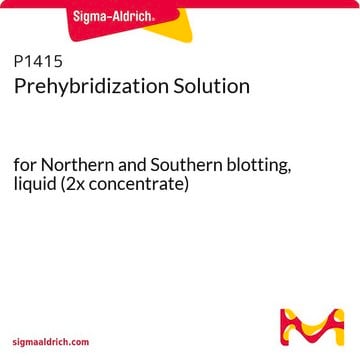11666681001
Roche
Buffers in a Box, Premixed SSC Buffer, 20x
pH 7.0, pkg of 4 L, solution
Synonym(s):
SSC buffer
Sign Into View Organizational & Contract Pricing
All Photos(1)
About This Item
UNSPSC Code:
12352200
Recommended Products
form
solution
packaging
pkg of 4 L
manufacturer/tradename
Roche
pH
7.0
shipped in
ambient
storage temp.
20-25°C
Related Categories
General description
20x solution
Application
Buffers in a Box, Premixed SSC Buffer, 20x has been used:
- as a wash buffer in in situ hybridization to determine the expression of miRNAs in paraffin-embedded tissue specimens
- as a wash buffer in single-molecule fluorescent in situ hybridization (smFISH) protocol using U2-OS cells and primary neuronal cultures
- as a component of rolling-circle amplification (RCA) hybridization buffer for use in fluorescent in situ sequencing (FISSEQ) of RNA for gene expression profiling in intact cells and tissue samples
Features and Benefits
- Stable 20x solution of saline sodium citrate (SSC) purified by filtration using a 0.2 μm pore size membrane
- resistant to enzymatic and nonenzymatic degradation
- free from nuclease or protease activity
- can store at room temperature
Quality
Absence of contaminants: Free of DNase and RNase according to the current Quality Control procedures.
Other Notes
For life science research only. Not for use in diagnostic procedures.
Storage Class Code
12 - Non Combustible Liquids
WGK
WGK 1
Flash Point(F)
does not flash
Flash Point(C)
does not flash
Certificates of Analysis (COA)
Search for Certificates of Analysis (COA) by entering the products Lot/Batch Number. Lot and Batch Numbers can be found on a product’s label following the words ‘Lot’ or ‘Batch’.
Already Own This Product?
Find documentation for the products that you have recently purchased in the Document Library.
Customers Also Viewed
Malgorzata J Latallo et al.
Methods (San Diego, Calif.), 162-163, 12-22 (2019-03-25)
The central dogma of molecular biology reaches a crescendo at its final step: the translation of an mRNA into its corresponding protein product. This process is highly regulated both spatially and temporally, requiring techniques to interrogate the subcellular translational status
Our team of scientists has experience in all areas of research including Life Science, Material Science, Chemical Synthesis, Chromatography, Analytical and many others.
Contact Technical Service








